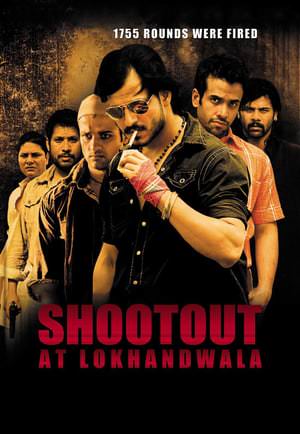Shootout at Lokhandwala Reviews and Ratings

-
It’s pointless and it lacks focus, it’s meandering and it makes very little sense. So that’s one out of five and a thumbs down for Apurva Lakhia’s Shootout At Lokhandwala.It tries to be a boy’s picture with guns and gore, but it lacks both style and substance. Because the film has no soul, it leaves you cold and unaffected.
-
Shootout At Wadala gives us a bunch of gangsters and cops, all trying very hard for coolth. It has action, some of it explosive, but not madly new. What stops it from becoming the film that it could have is an avalanche of dialogue, the sort of smart-alecky lines that sounded so right in the 70s. In 2013, they seem like a tired device to hang an entire film on.
-
This is the only gangster film in loving memory with no punctuation marks. No shot in the entire larger-than-strife films on murky morality lasts longer than five seconds. But within that selflimited footage the narrative scans the faces and souls of these ruthless gangsters and cops with savage candour.
-
When the Mumbai cops storm the building where the gansgters are hiding, they come with gunfire, bombs and even a rocket launcher! Yet, the phone lines aren’t jammed until the very end. Probably, the considerate director wanted his filmi gangsters to say their final goodbyes to their girlfriends.
-
The pace is relentless, the performances are memorable (Tusshar too finds his groove), the tenor is dramatic, yet realistic and the violence hits hard and proper. Go, get your thrills.
-
At the end of the day what stays with you are the sounds of multiple bullets being expended and blood being spilled. The fact that the lone reporter on the site is the pretty Dia Mirza attempting to egg on the viewers to make the police accountable leaves you cold. And that really is the problem with the film, it doesn’t touch you.
-
SAW is entertaining fare if you are willing to overlook authenticity, and the fact that the pace is sluggish in portions of the second half. Overall, it is a gangsta trip throbbing with adrenaline rush and Gupta does well to underplay the melodrama so as not to dilute the impact.
-
On the whole, SHOOTOUT AT WADALA is a fire-brand, paisa vasool entertainer. Brutal and electrifying, it is one of those theatre-going experiences that has a plot, is packaged well and has content [drama, action, dialogue, songs, performances] that works big time with the avid moviegoer. Sanjay Gupta delivers a solid punch!
-
It’s always tough to make a movie on any real life incident. Getting to the details can be an arduous task, but director Apoorva Lakhia sticks to his guns (no pun intended). There’s intricate care taken about every bit of detailing from clothes, to lighting, to camera angles, to sound, to action scenes. The script is airtight.
-
…the film could have been tighter, with the two and half ours being trimmed to around two. Shootout at Wadala is not classic, nor is it a ‘great’ film, but definitely ‘very good’, particularly if you have read the book, or enjoy the genre.
-
Director Apoorva Lakhia pays attention to the details but misses out on certain points. The cops are shown without bulletproof jackets while encountering the gunmen. The gangsters’ phone lines aren’t jammed till the dying moments of the long encounter. Also the movie has some unnecessary songs that slacken the story’s pace.
-
With Shootout, however, Gupta comes down to the lowest common denominator, pandering to the baser instinct in a manner which manages to make many in the audience squirm in their seats. Whether it is the crude jokes and the needlessly liberal doses of abusive language, the crudely shot love scenes between the principal characters played by John Abraham and Kangana Ranaut, or the manner in which the camera seeks to titillate the audiences in two of the item numbers, Shootout embodies much that is wrong with a certain kind of Indian cinema.
-
In journalism, stories, if confirmed, are true; if not, they stay rumours. This movie-fantasy, according to its poster, belongs to a vague genre called “true rumours”. Whatever that means to films, the case of bad journalism is evident in the conclusion. Friendly to the source, the film, having glorified the Mafia thus far, verbally argues for encounters as a way to deal with deadly criminals. You know the juvenile world-view then. And by now, you know the rumour part was actually the hype around this flick.
-
From the plot point of view, the film is very simple. In fact Amitabh Bachchan, who plays an advocate in the film, summarizes it all by asking a question – “If you see a man with a gun near your house, whom would you prefer – a cop or a gangster?” This pretty much justifies the horror acts that you see in the penultimate 30 minutes of the film when each of the gangsters meets with a brutal end.
-
Shootout At Lokhandwala’s tagline is a contradiction—”true rumours”—a clear indication of how facile a film it is. It shows no engagement with the politics of encounter killing, which is its core idea, but glorifies violence and machismo.
-
Though Lakhia tries to infuse all the tricks in the last great shootout in the film, there are still moments that are strikingly resonant, mostly because the actors themselves leave their entire hammy dialog and the bad posturing for some real life brutality. It appears to me that they trusted their action choreographer more than their director.
-
By no means is this an accurate account of events or can be taken seriously as a piece of docu drama. Shootout at Wadala is pulpy, kitschy, Bollywood masala that makes no bones about its intentions: To titillate.























